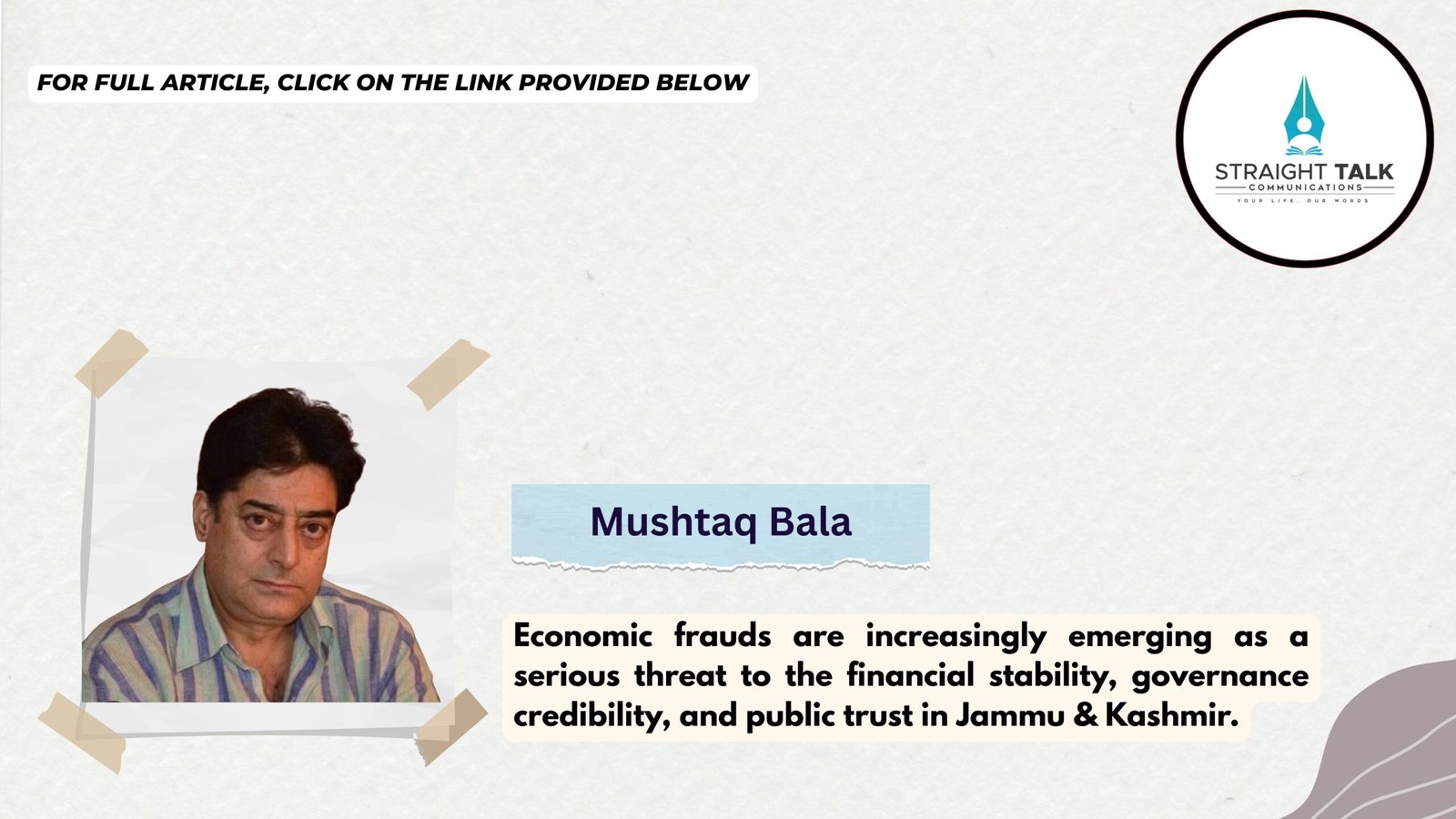Economic Frauds in J&K: A Growing Challenge to Governance and Public Trust

Mushtaq Bala
Economic frauds are increasingly emerging as a serious threat to the financial stability, governance credibility, and public trust in Jammu & Kashmir. In recent years, law enforcement agencies — particularly the Crime Branch Kashmir (CBK) and the Anti-Corruption Bureau (ACB) — have exposed a series of scams ranging from land grabs to investment frauds, banking irregularities, and insurance scams. The sheer diversity of these cases reveals that economic offences in the region are not confined to one sector, but are a systemic problem requiring urgent attention.
The Nature of the Problem
Economic frauds typically involve deceit for personal or corporate gain — often at the cost of ordinary citizens and public institutions. In J&K, these range from:
• Land-related frauds: Forging revenue records, fake mutations, and fraudulent land allotments, particularly of Custodian and State land.
• Investment scams: Ponzi schemes, cooperative society frauds, and bogus insurance or banking investment offers.
• Procurement and contract manipulation: Inflated tenders, kickbacks, and delivery of substandard goods or services to government departments.
• Loan and credit frauds: Obtaining loans through forged documents or siphoning funds through shell entities.
The most alarming aspect is that in many cases, fraudsters operate with the alleged collusion of insiders — whether in government departments, financial institutions, or private companies — making detection and prosecution more challenging.
Recent High-Profile Cases
Just in the last few months, J&K has seen several high-profile economic offence cases:
• The ACB’s exposure of large-scale land scams in Jammu district, where Custodian land was fraudulently transferred through forged orders.
• The CBK’s recent crackdown in Srinagar against fraudsters accused of duping citizens through fake deposit schemes linked to insurance and cooperative societies.
• Multiple banking fraud cases in which fake collateral and falsified identities were used to siphon off loans.
These incidents underline how economic crimes are not isolated events but part of a persistent pattern exploiting loopholes in the system.
Why J&K Is Vulnerable
Several factors make the Union Territory particularly susceptible to economic frauds:
1. Legacy of Poor Record-Keeping: Land and financial records in many cases remain incomplete, scattered, or not digitized, creating space for manipulation.
2. Public Unawareness: Many victims lack awareness about legal safeguards, making them easy targets for investment scams.
3. Institutional Collusion: Cases often reveal that fraudsters had inside help — whether in processing fake documents or bypassing verification.
4. Legal Delays: Lengthy trial processes reduce deterrence, as cases drag on for years without resolution.
Impact on the Public and Economy
The consequences of economic frauds extend far beyond monetary loss. They erode public trust in governance, discourage legitimate investment, and burden law enforcement and judicial systems. For ordinary citizens, the damage is personal — life savings lost in scams, land disputes lasting decades, and a deep sense of vulnerability.
For the UT’s economy, such frauds distort fair market practices, undermine investor confidence, and create inefficiencies that slow down development.
The Way Forward: Prevention, Not Just Punishment
Experts and law enforcement officials agree that tackling economic fraud requires a two-pronged approach: strong enforcement and systemic prevention.
• Digitization & Transparency: Complete digitization of land, revenue, and corporate records can reduce opportunities for forgery and unauthorized manipulation.
• Public Awareness Campaigns: Educating citizens on how to verify investment schemes, property titles, and official documents before committing money.
• Strengthening Oversight: Empowering independent financial and land audit bodies with real-time access to transaction data.
• Swift Prosecution: Setting up special economic offence courts to ensure speedy trials and deter repeat offences.
• Whistleblower Protections: Encouraging insiders to report fraud without fear of retaliation.
Restoring Confidence
The ongoing crackdowns by ACB and CBK are a step in the right direction, but for lasting impact, these must be backed by institutional reforms and public vigilance. Economic fraud is not just a financial crime — it is an attack on the social and moral fabric of society. Every rupee lost to a scam is a rupee diverted from development, welfare, or genuine business growth.
For Jammu & Kashmir, building a fraud-resistant system is essential not just for protecting citizens’ wealth, but for restoring faith in governance and creating an environment where honest enterprise can thrive. The message must be clear — deceit, no matter how sophisticated, will be detected, prosecuted, and punished.
(Mushtaq Bala is a prominent Journalist and award-winning filmmaker. He is Editor at Weekly kashmir Pen)







